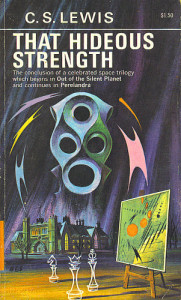Last month, I presented a paper to the C. S. Lewis Foundation’s Academic Roundtable at its fall retreat. This is the third installment of that paper, which focuses on Lewis’s concerns that an elite would create a totalitarian state. This installment shows how Lewis portrayed that in his novel That Hideous Strength.
 Enter That Hideous Strength, first published in 1945, one year after the appearance of The Abolition of Man. The centerpiece in the novel of the unholy alliance between science and the omnicompetent state is the National Institute of Co-ordinated Experiments, or N.I.C.E., a rather clever way of demonstrating how totalitarianism can put on a humane face. In a sentence tinged with an understated sarcasm, Lewis describes the N.I.C.E. as “the first-fruits of that constructive fusion between the state and the laboratory on which so many thoughtful people base their hopes of a better world.”
Enter That Hideous Strength, first published in 1945, one year after the appearance of The Abolition of Man. The centerpiece in the novel of the unholy alliance between science and the omnicompetent state is the National Institute of Co-ordinated Experiments, or N.I.C.E., a rather clever way of demonstrating how totalitarianism can put on a humane face. In a sentence tinged with an understated sarcasm, Lewis describes the N.I.C.E. as “the first-fruits of that constructive fusion between the state and the laboratory on which so many thoughtful people base their hopes of a better world.”
As the rather vain and eager-to-enter-into-the-inner-ring Bracton professor Mark Studdock is introduced to the goals of the N.I.C.E. by the devious Lord Feverstone, he is informed that someone needs to take over the human race and re-condition it. Techniques will include sterilization, liquidation of backward races, selective breeding, and psychological conditioning leading to biochemical conditioning and direct manipulation of the brain.
Playing to Studdock’s desire to be part of the new age that is dawning, Feverstone entices him with this promise: “Man has got to take charge of Man. That means, remember, that some men have got to take charge of the rest–which is another reason for cashing in on it as soon as one can. You and I want to be the people who do the taking charge, not the ones who are taken charge of.”
Studdock’s role is to be one of the propagandists for the organization, writing untruths to win over the general public and also to influence the House of Commons. Lewis doesn’t seem to see much difference between the two audiences–both are equally and easily led by the nose.
When Studdock questions how they can pull off a “newspaper stunt . . . without being political, and wonders whether it’s the newspapers on the Right or the Left that will print his articles, Hardcastle [the head of the institution’s police force] schools him on how to manipulate politics:
Don’t you understand anything? Isn’t it absolutely essential to keep a fierce Left and a fierce Right, both on their toes and each terrified of the other? That’s how we get things done. Any opposition to the N.I.C.E. is represented as a Left racket in the Right papers and a Right racket in the Left papers. If it’s properly done, you get each side outbidding the other in support of us–to refute the enemy slanders. Of course we’re non-political. The real power always is.
As the N.I.C.E. goes forward with its agenda, it engineers riots, getting the government to declare a state of emergency. Then it maneuvers itself into the position of being given the authority to make the rules for the state of emergency.
To top off the plan, the hope is that Lord Feverstone, who already is a Member of Parliament, will receive the post of emergency governor. Then the N.I.C.E. will, in effect, become the new civil government as its power and influence expands. Totalitarian government will then carry out the nefarious plot of re-conditioning the human race.
How did Lewis see the beginnings of this totalitarian state in his own time? That will be the subject of the next installment.
